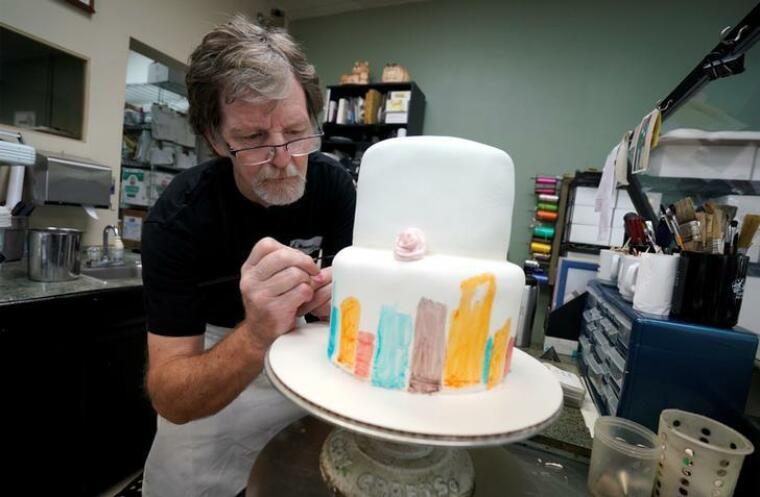US Supreme Court affirms right of Christian baker to refuse to make same-sex wedding cake

The U.S. Supreme Court has handed down a decision backing a Christian baker's right to refuse to make a wedding cake for a same-sex couple in a high-profile case that has been widely seen as a test for religious freedom.
In a 7–2 ruling on Monday, the high court contended that the First Amendment rights of Masterpiece Cakeshop owner Jack Phillips have been violated by the Colorado Civil Rights Commission when he had been ordered to pay fines for refusing to bake a same-sex wedding cake.
"The Commission's hostility was inconsistent with the First Amendment's guarantee that our laws be applied in a manner that is neutral toward religion," Justice Anthony Kennedy stated in his majority opinion, as reported by Fox News.
"The reason and motive for the baker's refusal were based on his sincere religious beliefs and convictions. The Court's precedents make clear that the baker, in his capacity as the owner of a business serving the public, might have his right to the free exercise of religion limited by generally applicable laws," he added.
Phillips, who was represented in court by the Alliance Defending Freedom (ADF), was sanctioned by the state civil rights commission after he refused to make a custom wedding cake for Charlie Craig and David Mullins. The Christian baker noted at the time that he could not create a cake with a message that conflicted with his religious beliefs.
The commission argued that the message on the cake will be attributed to the customer and not the baker.
The justices pointed out that while the commission had not allowed Phillips to decline service for a same-sex wedding, it had upheld the rights of three other bakers to turn down orders for cakes "that demeaned gay persons or gay marriages."
The high court noted that the decision still allows governments to enact anti-discrimination laws "so long as the law is applied neutrally and without hostility to religion."
The narrow ruling has not resolved other legal disputes involving other businesses that cater to weddings, including photographers and other florists.
Experts have noted that Monday's decision was primarily focused on how the commission handled Phillips' case. The ruling had not made a definitive judgment on how anti-discrimination laws apply to businesses that cite religion to turn away LGBT customers.
Michael Farris, the president of the ADF, hailed the Supreme Court decision, but noted that other cases involving religious freedom and same-sex marriage are still "left unanswered."
He pointed to another case, Arlene's Flowers v. State of Washington, which has also been filed at the Supreme Court. He noted that a decision on the case could be handed down as soon as next week.
 Christians don't have to affirm transgenderism, but they can’t express that view at work: tribunal
Christians don't have to affirm transgenderism, but they can’t express that view at work: tribunal Archaeology discovery: Medieval Christian prayer beads found on Holy Island
Archaeology discovery: Medieval Christian prayer beads found on Holy Island Presbyterian Church in America votes to leave National Association of Evangelicals
Presbyterian Church in America votes to leave National Association of Evangelicals Over 50 killed in 'vile and satanic' attack at Nigerian church on Pentecost Sunday
Over 50 killed in 'vile and satanic' attack at Nigerian church on Pentecost Sunday Ukrainian Orthodox Church severs ties with Moscow over Patriarch Kirill's support for Putin's war
Ukrainian Orthodox Church severs ties with Moscow over Patriarch Kirill's support for Putin's war Islamic State kills 20 Nigerian Christians as revenge for US airstrike
Islamic State kills 20 Nigerian Christians as revenge for US airstrike Man who served 33 years in prison for murder leads inmates to Christ
Man who served 33 years in prison for murder leads inmates to Christ


 Nigerian student beaten to death, body burned over ‘blasphemous’ WhatsApp message
Nigerian student beaten to death, body burned over ‘blasphemous’ WhatsApp message 'A new low': World reacts after Hong Kong arrests 90-year-old Cardinal Joseph Zen
'A new low': World reacts after Hong Kong arrests 90-year-old Cardinal Joseph Zen Iran sentences Christian man to 10 years in prison for hosting house church worship gathering
Iran sentences Christian man to 10 years in prison for hosting house church worship gathering French Guyana: Pastor shot dead, church set on fire after meeting delegation of Evangelicals
French Guyana: Pastor shot dead, church set on fire after meeting delegation of Evangelicals ‘Talking Jesus’ report finds only 6% of UK adults identify as practicing Christians
‘Talking Jesus’ report finds only 6% of UK adults identify as practicing Christians Mission Eurasia ministry center blown up in Ukraine, hundreds of Bibles destroyed: 'God will provide'
Mission Eurasia ministry center blown up in Ukraine, hundreds of Bibles destroyed: 'God will provide' Church holds service for first time after ISIS desecrated it 8 years ago
Church holds service for first time after ISIS desecrated it 8 years ago Burger King apologizes for 'offensive campaign' using Jesus' words at the Last Supper
Burger King apologizes for 'offensive campaign' using Jesus' words at the Last Supper Uganda: Muslims abduct teacher, burn him inside mosque for praying in Christ’s name
Uganda: Muslims abduct teacher, burn him inside mosque for praying in Christ’s name